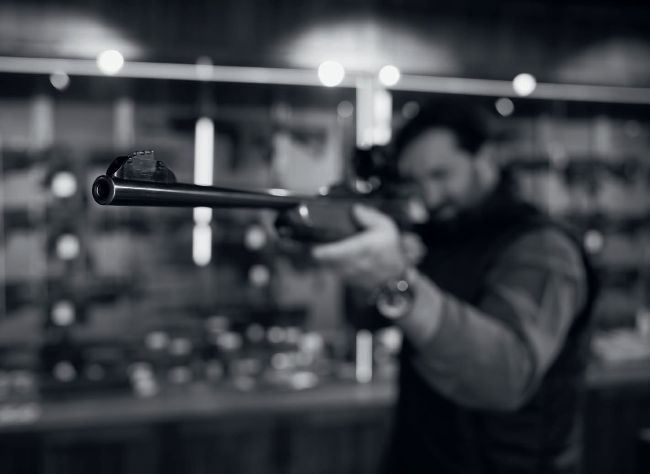ENGAGE, ENLIGHTEN AND ELEVATE: THE POWER OF IN-STORE EVENTS
Discover how hosting in-store events, workshops and demonstrations can transform your retail business. From boosting visibility and driving sales to promoting community engagement, this guide provides innovative ideas, strategic planning tips and effective methods for measuring success.

IMAGE: SHUTTERSTOCK -SNOMAD_SOUL
In today’s competitive retail environment, creating a distinctive in-store experience is pivotal for engaging customers and building brand loyalty, especially in niche markets like hunting and shooting. Recent studies indicate that in-store events can increase foot traffic by up to 40% and significantly boost same-day sales. Hosting workshops, demonstrations and community events not only enhances visibility but also establishes your store as a community hub for enthusiasts and experts alike. This guide delves deep into the strategic benefits of in-store events, from elevating brand presence to driving substantial sales growth. It provides retail managers and business owners with innovative ideas, comprehensive planning tips and effective methods for measuring the impact of these events. Whether you’re looking to raise community engagement or heighten your store’s profile, embracing the dynamic world of in-store events can transform your business landscape and yield lasting benefits.
THE VALUE OF HOSTING IN-STORE EVENTS
In-store events are not just activities; they are a strategic tool for retailers in the hunting and shooting sectors, offering extensive benefits that can profoundly influence both customer relationships and business success:
Community building: Events like workshops and local gatherings promote a strong community spirit among hunting and shooting enthusiasts, which is essential in building loyalty and trust. By regularly hosting these events, your shop can transform into a community hub where like-minded individuals can share experiences, tips and stories. This sense of belonging can be particularly effective in retaining customers and encouraging frequent visits, thereby strengthening community ties.
Brand visibility: Each event hosted at your store is an opportunity to enhance your visibility within the local area. Events attract not only regular customers but also occasional visitors and firsttimers, significantly increasing foot traffic. Moreover, these gatherings create a buzz around your brand as attendees are likely to share their experiences on social media or through word-of-mouth, further amplifying your store’s presence in the market.
Customer engagement: Interactive events provide customers with a hands-on experience of the products. This direct engagement allows customers to test out gear, ask detailed questions and receive expert advice, leading to a deeper understanding and appreciation of the products. Such interactions also help in building a rapport between the staff and customers, enhancing the overall shopping experience and making it more personalised and impactful.
Sales boost: Demonstrations and specialised workshops showcase products in action, which can be a powerful sales driver. Seeing a product perform or understanding its utility in a practical scenario can motivate purchases. Additionally, offering exclusive promotions or discounts during event days can further entice customers to buy, often increasing sales significantly during and immediately after the event.
Long-term impact: Beyond the immediate benefits, hosting in-store events can have a lasting impact on your business. They help in establishing a reputation as a leader and expert within the local hunting and shooting community. Long-term engagement through regular events can lead to sustained high traffic to the store and a stable increase in sales over time, proving the strategic value of integrating events into your business model.
EVENT IDEAS FOR HUNTING AND SHOOTING RETAILERS
To connect effectively with enthusiasts and boost both interest and sales, consider implementing a variety of dynamic in-store events tailored to the interests of the hunting and shooting community:
Product demonstrations: Collaborate with manufacturers and suppliers to showcase the latest in firearms, optics and hunting gear. These demonstrations not only allow customers to see and handle new products but also to witness their effectiveness in real-world scenarios. For instance, arranging live demonstrations at a nearby range can greatly enhance customer understanding and appreciation of the products. Furthermore, such events provide an excellent opportunity for suppliers to receive direct feedback, strengthening your relationships with both customers and suppliers.
Skills workshops: Offer workshops that cover a wide range of topics such as firearm maintenance, advanced shooting techniques and key skills for hunters. By providing expert-led sessions, your store can become a go-to resource for both beginners and seasoned enthusiasts looking to hone their skills. Consider having recurring workshops with progressive difficulty levels or different focuses to keep customers engaged and returning.
Guest speakers: Invite renowned experts, local heroes or celebrities from the hunting and shooting world to speak at your events. These could include famous hunters, competitive shooters or wildlife conservationists. Such guest appearances can draw larger crowds and increase the store’s prestige and credibility. Plan Q&A sessions or meet-and-greet opportunities
post-discussion to maximise customer interaction with the guest.
Competitions and challenges: Organise events such as shooting competitions, hunting simulations or scenario-based challenges that can engage a wide audience. These competitions can be designed to cater to different skill levels, ensuring inclusivity while providing a thrilling and competitive atmosphere. Additionally, hosting prize giveaways or recognition awards can further enhance participation and excitement around these events.
Youth engagement: Develop programs specifically aimed at engaging younger audiences, such as introductory shooting classes, wildlife education workshops or safety training sessions. Early engagement is crucial for cultivating a new generation of enthusiasts and ensuring the long-term sustainability of the hunting and shooting community. Partner with schools, scouting groups or local youth organisations to broaden the reach of these events and build community relationships.
PLANNING AND PROMOTION STRATEGIES FOR SUCCESSFUL IN-STORE EVENTS
Effective planning and strategic promotion are the foundations of successful in-store events. Detailed preparation and proactive marketing can significantly enhance attendance and engagement. Here are expanded strategies to ensure your events are well-executed and achieve their intended goals:
Set clear objectives: Begin by defining precise objectives for each event. Whether your goal is to increase sales, enhance brand awareness or strengthen community ties, having clear objectives will provide a focused direction for all planning activities. For instance, if the aim is to boost sales, the event should be structured to highlight product benefits and include live demonstrations that encourage on-thespot purchases.
Create a detailed plan: Comprehensive planning is crucial. Outline every aspect of the event, including logistics like venue, timing and layout, as well as budgeting, staffing and the schedule of activities. Anticipate potential challenges—such as bad weather for outdoor events or technology failures for digital displays— and prepare contingency plans. Ensuring that every detail is meticulously planned will minimise disruptions and enhance the event experience for all attendees.
Collaborate with partners: Form partnerships with suppliers, local clubs and industry experts to enrich the quality and credibility of your events. Such collaborations can also provide financial benefits by sharing costs and expanding promotional reach. Partners may offer exclusive products for demonstrations or provide expert speakers, adding substantial value to the event.
Promote early and widely: Leverage multiple promotional channels to ensure your event reaches a broad audience. Utilise social media platforms, email newsletters, in-store signage and local media outlets. Start your promotional activities well in advance to generate buzz and build anticipation. Tailoring your message to different platforms can also help in reaching diverse audience segments effectively.
BY OFFERING VALUABLE EXPERIENCES AND CREATING A SENSE OF COMMUNITY, RETAILERS CAN BUILD LASTING RELATIONSHIPS WITH CUSTOMERS AND STRENGTHEN THEIR MARKET POSITION
Engage your audience: Active engagement on social media is key to creating excitement around the event. Share teasers, behind-the -scenes looks and regular updates to keep potential attendees interested. Utilise features like countdowns, live Q&A sessions or interactive polls to maintain engagement. Encourage your audience to RSVP through social media events or apps, and incentivise them to share the event within their networks.
Offer incentives: Incentives such as special offers, discounts or exclusive merchandise for event attendees can significantly boost attendance. Consider time -bound promotions that encourage customers to make purchases during the event or provide loyalty bonuses for those who participate in multiple events.
Measure and adapt: After the event, measure its success against your initial objectives. Collect feedback from participants to understand their experiences and areas for improvement. Analyse attendance, sales data and social media engagement metrics to gauge the overall impact. This information is crucial for adapting and improving future events.
TIPS FOR MEASURING THE SUCCESS OF IN-STORE EVENTS
Accurately evaluating the success of your events is essential for understanding their impact and refining your approach for future initiatives. Use these detailed methods to gauge effectiveness and gather actionable insights:
Track attendance: Maintain accurate records of how many people attend your events. Use a registration system at the entrance or digital RSVPs to capture data. Analysing attendance figures helps you understand which types of events are most appealing. For example, compare the attendance of different themes or formats and identify trends or patterns that can inform future event planning.
Monitor sales: Carefully track sales data before, during and after the event. Look for spikes in sales during the event, especially of featured products or services. This can directly indicate the event’s effectiveness in driving purchases. Additionally, monitor post-event sales to assess any prolonged impact, such as increased interest in products due to effective demonstrations or promotions.
Collect feedback: Implement structured methods to collect feedback from attendees. Use digital surveys sent via email or social media immediately after the event, or provide comment cards during the event itself. Ask specific questions about what participants liked, what could be improved and what they found most engaging. This qualitative data is invaluable for highlighting successful elements and areas needing refinement.
Analyse social media engagement: Evaluate the performance of your event-related posts on social media platforms. Look at metrics such as likes, shares, comments and reach. High engagement levels generally indicate that the content was compelling and that the promotion strategy was effective. Additionally, monitor any increases in followers or subscriptions as a result of the event, as these can be indicators of growing brand interest.
Review return on investment (ROI): Calculate the ROI by comparing the total costs involved in hosting the event (including marketing, staff time and resources) against the revenue generated directly from the event. Consider both direct financial gains and indirect benefits, such as new customer data acquired or future sales opportunities seeded at the event. A positive ROI signifies not just financial success but also validates the event’s strategic alignment with business goals.
Long-term impact analysis: Beyond immediate metrics, assess the long-term impacts of your events on brand reputation and customer loyalty. This might involve tracking repeat customer visits, subscription sign-ups or sustained increases in store traffic. Understanding these longer-term dynamics helps to evaluate the enduring value of your event strategies.
CONCLUSION
Hosting in-store events, workshops and demonstrations present a unique opportunity for UK retailers to engage their local community, enhance their visibility and drive sales. By offering valuable experiences and creating a sense of community, retailers can build lasting relationships with customers and strengthen their market position. With careful planning, effective promotion and thorough evaluation these events can become a pivotal part of a retailer’s strategy yielding significant rewards for both the business and its customers.

IMAGE: SHUTTERSTOCK -BEARFOTOS